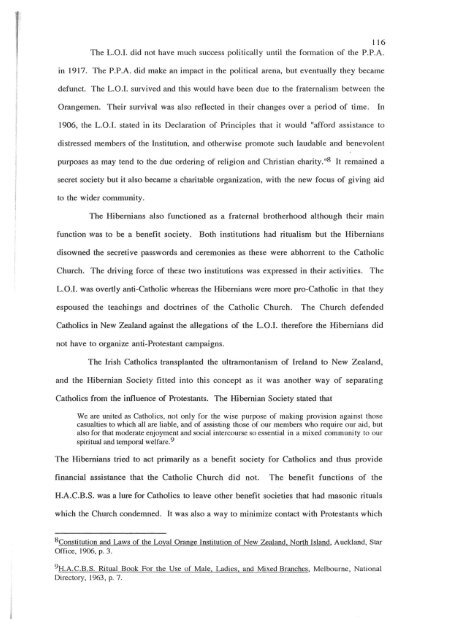TRANSPLANTED IRISH INSTITUTIONS - University of Canterbury
TRANSPLANTED IRISH INSTITUTIONS - University of Canterbury
TRANSPLANTED IRISH INSTITUTIONS - University of Canterbury
Create successful ePaper yourself
Turn your PDF publications into a flip-book with our unique Google optimized e-Paper software.
116<br />
The L.O.1. did not have much success politically until the fonnation <strong>of</strong> the P.P.A.<br />
In 1917. The P.P.A. did make an impact in the political arena, but eventually they became<br />
defunct. The L.O.1. survived and this would have been due to the fraternalism between the<br />
Orangemen. Their survival was also reflected in their changes over a period <strong>of</strong> time.<br />
In<br />
1906, the L.O.I. stated in its Declaration <strong>of</strong> Principles that it would "afford assistance to<br />
distressed members <strong>of</strong> the Institution, and otherwise promote such laudable and benevolent<br />
purposes as may tend to the due ordering <strong>of</strong> religion and Christian charity. "8 It remained a<br />
secret society but it also became a charitable organization, with the new focus <strong>of</strong> giving aid<br />
to the wider community.<br />
The Hibernians also functioned as a fraternal brotherhood although their main<br />
function was to be a benefit society. Both institutions had ritualism but the Hibernians<br />
disowned the secretive passwords and ceremonies as these were abhorrent to the Catholic<br />
Church. The driving force <strong>of</strong> these two institutions was expressed in their activities. The<br />
L.O.I. was overtly anti-Catholic whereas the Hibernians were more pro-Catholic in that they<br />
espoused the teachings and doctrines <strong>of</strong> the Catholic Church.<br />
The Church defended<br />
Catholics in New Zealand against the allegations <strong>of</strong> the L.O.I. therefore the Hibernians did<br />
not have to organize anti-Protestant campaigns.<br />
The Irish Catholics transplanted the ultramontanism <strong>of</strong> Ireland to New Zealand,<br />
and the Hibernian Society fitted into this concept as it was another way <strong>of</strong> separating<br />
Catholics from the influence <strong>of</strong> Protestants. The Hibernian Society stated that<br />
We are united as Catholics, not only for the wise purpose <strong>of</strong> making provision against those<br />
casualties to which all are liable, and <strong>of</strong> assisting those <strong>of</strong> our members who require our aid, but<br />
also for that moderate enjoyment and social intercourse so essential in a mixed community to our<br />
spiritual and temporal welfare. 9<br />
The Hibernians tried to act primarily as a benefit society for Catholics and thus provide<br />
financial assistance that the Catholic Church did not.<br />
The benefit functions <strong>of</strong> the<br />
H.A.C.B.S. was a lure for Catholics to leave other benefit societies that had masonic rituals<br />
which the Church condemned. It was also a way to minimize contact with Protestants which<br />
8Constitution and Laws <strong>of</strong> the Loyal Orange Institution <strong>of</strong> New Zealand, North Island, Auckland, Star<br />
Office, 1906, p. 3.<br />
9H.A.C.B.S. Ritual Book For the Use <strong>of</strong> Male, Ladies, and Mixed Branches, Melbourne, National<br />
Directory, 1963, p. 7.
















